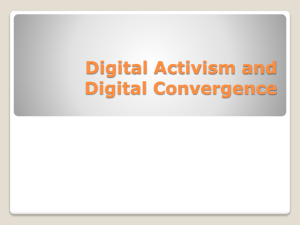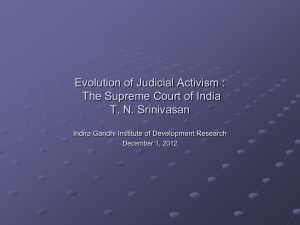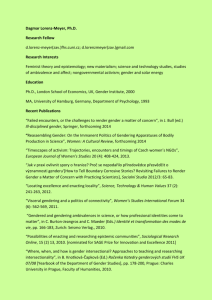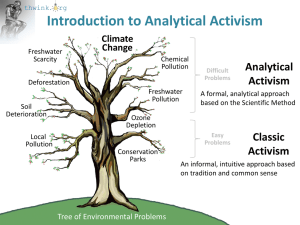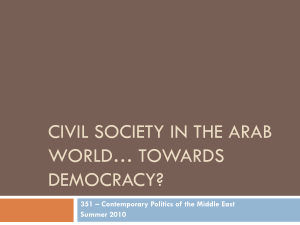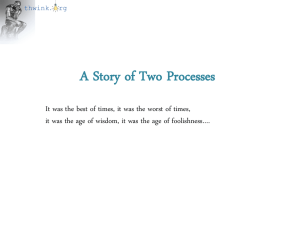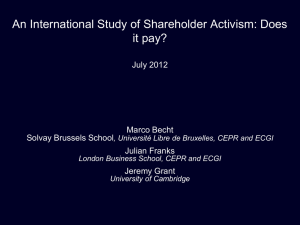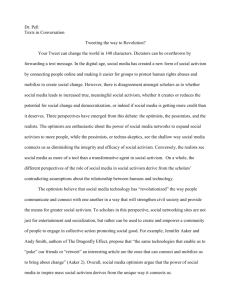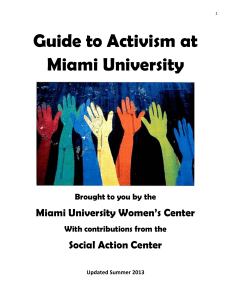The Importance of Organic Activism in Student Life
advertisement
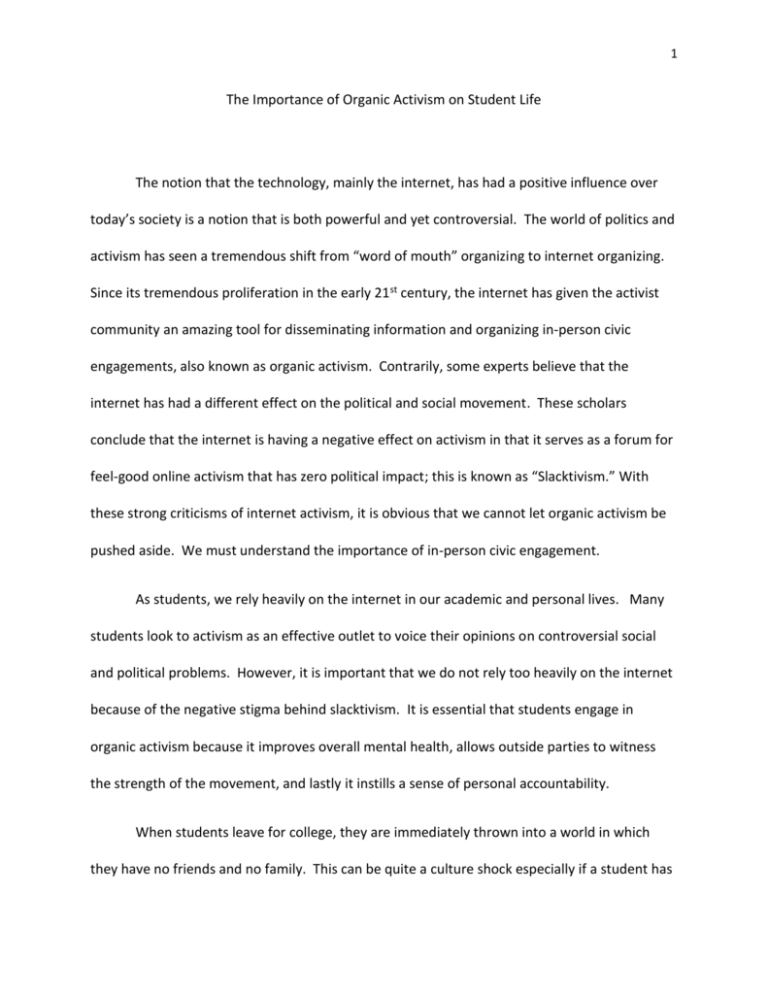
1 The Importance of Organic Activism on Student Life The notion that the technology, mainly the internet, has had a positive influence over today’s society is a notion that is both powerful and yet controversial. The world of politics and activism has seen a tremendous shift from “word of mouth” organizing to internet organizing. Since its tremendous proliferation in the early 21st century, the internet has given the activist community an amazing tool for disseminating information and organizing in-person civic engagements, also known as organic activism. Contrarily, some experts believe that the internet has had a different effect on the political and social movement. These scholars conclude that the internet is having a negative effect on activism in that it serves as a forum for feel-good online activism that has zero political impact; this is known as “Slacktivism.” With these strong criticisms of internet activism, it is obvious that we cannot let organic activism be pushed aside. We must understand the importance of in-person civic engagement. As students, we rely heavily on the internet in our academic and personal lives. Many students look to activism as an effective outlet to voice their opinions on controversial social and political problems. However, it is important that we do not rely too heavily on the internet because of the negative stigma behind slacktivism. It is essential that students engage in organic activism because it improves overall mental health, allows outside parties to witness the strength of the movement, and lastly it instills a sense of personal accountability. When students leave for college, they are immediately thrown into a world in which they have no friends and no family. This can be quite a culture shock especially if a student has 2 never experienced this before. This phenomenon can have quite a negative effect on students’ mental health. One way to combat this problem is through organic activism. Recent research done by Megan Gilster, a PhD candidate at the University of Michigan, suggests, “Residents of (organic) activist neighborhoods have better mental health, especially in terms of neighborhood sense of control, mastery, and hopelessness” (Gilster 109). Gilster attributes these positive effects on the community are related to what psychologists refer to as the empowerment theory. The empowerment theory is defined as “the process in which individuals and groups gain power, access to resources and control over their own lives. In doing so, they gain the ability to achieve their highest personal and collective aspirations and goals (Napier 2). Gilster’s conclusion suggests that students’ mental health can benefit greatly from organic activism. Another reason students ought to engage in political and social activism is to give the world a sense of strength within a particular movement. In this world, there are many great iniquities plaguing people around the world and in the United States - These injustices must be stopped. We live and attend school in a country that has a great influence on the world around us and we must take advantage of this. However, we cannot make changes to our culture without having great strength in numbers to reflect our views onto the world. In other words, one person can seldom invoke real social and political change. For example lets look at Egypt’s recent revolution. An Egyptian activist by the name of Hossam el-Hamalawy held his first demonstration in the fight for Egyptian political reform in 1998. Consequently, he was imprisoned and tortured for two years by the Egyptian police (Schemm 1). His vision and struggle came to fruition nearly thirteen years later when the masses took the street. This example shows that these political movements must have strength in numbers to assert their 3 force on the community, the nation, and the world. History has shown us that we cannot make great social and political change without support from our peers. That is why students must get involved; we are the future. Lastly, as our culture becomes more dependent on technology, it is much easier to become complacent when it comes to activism. As the Internet becomes more and more intertwined with our culture, it seems that it offers us an outlet to voice our opinions with both anonymity and from the comfort of our desk chairs. We see all too often that our generation has the propensity to “left click” a Facebook cause or the “Join” link for a political activist group and sometimes this is recognized as making a difference in the world. It must be understood that even though this is an effective tool to disseminate information and organize people, it is not the way to make social and political change. In a recent essay, Clay Shirky advised against relying on the internet because of its inherent dependency on government controlled utilities that can be used to censor activism and also provides nations with a platform to weaponize internet activism to further political aspirations (Shirky 3). Even though this notion seems to be overly pessimistic and perhaps a tad paranoid, one cannot dismiss this as a possibility. In other words, we must recognize that the means to the end, social and political change, is organic activism and not internet activism, or slacktivism. We need to understand that organic activism serves as inscrutable evidence of value and change. Personal accountability is the cornerstone of effective activism. In summary, as students we have a responsibility to our generation and generations to come. It is obvious that students have a lot to gain from organic activism. Firstly, as pointed 4 out in Gilbert’s study, students can improve their overall mental health by engaging in organic activism. Secondly, as demonstrated by Hossam el-Hamalawy, we must show strength in numbers in order to propagate our views into action. Lastly, practicing in-person civic engagement as opposed to reliance on internet activism and slacktivism will allow us to combat censorship and the weaponization of mainstream media outlets. Finally, we are the future generation that will inherit this world in years to come and one day we must offer this world to our children. We must get involved; we need to ensure that we leave this world a better place for generations to come. It is crucial that students support organic activism for it will offer us better mental health, give strength to movements, and lastly it will display personal accountability. In the words of Martin Luther King Jr., “In the End, we will remember not the words of our enemies, but the silence of our friends”. Work Cited Gilster, Megan. Neighborhood Activism in Context: Three Studies of the Neighborhood Antecedents and Individual Effects of Participation in Neighborhood Activism. 5 University of Michigan Library, Web. 1 May 2011. Napier, Andrea. Empowerment Theory. Malone University, Web. 1 May 2011 Schemm, Paul. “Veteran Egypt activist sees revolution as ongoing.” Associated Press. Associated Press, 19 Feb 2011. Web. 1 May 2011. Shirky, Clay. “The Political Power of Social Media: Technology, the Public Sphere, and Political Change.” Politics from a New Perspective (2011): n. pag. Web. 1 May 2011.


